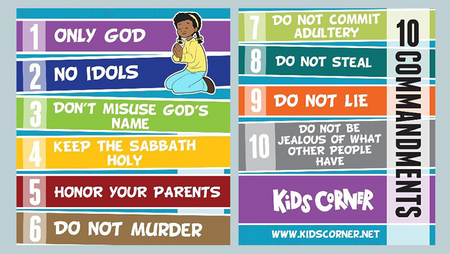
A Small Sin is a Big Deal
Bible Verse
8 If we say we have not sinned, we are fooling ourselves, and the truth isn't in our hearts. 9 But if we confess our sins to God, he can always be trusted to forgive us and take our sins away. 10 If we say we have not sinned, we make God a liar, and his message isn't in our hearts. 1 John 1:8-10
John and his daughter Emily carried two bags of groceries back to the car. As they were driving out of the parking lot, John noticed Emily had a candy bar in her pants' pocket. "Where'd you get that? John asked. Seeing that she was caught, Emily mumbled, "From the store." While Emily witnessed the quick u-turn back to the store, she tried to be dismissive saying, "Dad, you are making this into way too big of a deal!"
Has your child ever been dismissive about a sin? 1 John 1:8-10 shows that when we deny our sin, we not only lie to ourselves but we also break our relationship with God. We can help them see that regardless of the sin they need to repent.
1. Define what sin is (but also teach about forgiveness!)
It’s important for us to teach our children what sin is. Start with a simple definition: sin is the bad stuff we do that makes God sad and separates us from him, often hurting us and other people (See Isaiah 59:1-2; Rom. 3:23; James 4:17). Offer your child examples they can relate to: fighting with a brother or sister, stealing from a friend, or disobeying mom or dad. Assure your child that we all make mistakes and sin. Tell them the good news that Jesus died to save us from our sins. And encourage them to confess their sins to God and assure them that God will forgive their sins because he is faithful and just (1 John 1:9).
2. Describe how God wants us to live
Kids are concrete thinkers. So, it's helpful to give examples of how God wants us to live. Jesus said, “If you love me you will obey what I command” (John 14:15). What does God command? An easy and essential teaching tool is God’s Ten Commandments. However, don’t just list off the commandments. Instead talk with your child about how keeping each commandment ensures we maintain the best possible relationship with God and with our neighbors. Talk to your children about making good choices based on the Ten Commandments.
3. Display what it means to be a Christian
Show your children what it looks like to live as someone who has truly been forgiven. 1 John 3:4-6 says, “No one who lives in Him, keeps on sinning. No one who continues to sin has either seen Him or known Him.” Talk with your child about how being in relationship with God and talking to him in prayer can help them make better choices. Let them know that God has a plan for them and he calls all believers to serve others, to love their neighbors, and to do what’s right (and that includes kids!).
Our kids need to recognize that every sin is a big deal. But we should never stop there. We must share the life-giving truth that no matter how big or small our sins, if we confess our sin, God is faithful to forgive. And because we are forgiven we can live lives according to his commands and in fulfillment of his plan!
Want to dig deeper? Check out Family Fire's article "Effective Discipline: Echoing the Gospel Rhythm of Grace"



